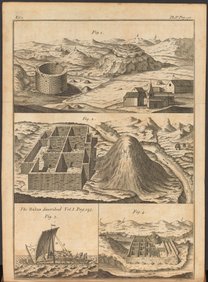A Voyage to South America, Volume 1
- 1758

Rights
Download all 6 images
PDFZIPof full-sized JPGsDownload selected image
Small JPG1200 x 1841px — 412 KBLarge JPG2880 x 4418px — 2.1 MBFull-sized JPG3078 x 4722px — 2.4 MBOriginal fileTIFF — 3078 x 4722px — 41.6 MBVolume one of the first English translation of Relacion Historica del Viaje a la America Meridional (Madrid, 1743) by Antonio de Ulloa (1716 – 1795), containing a description of the greater part of South America, its natural history, and its inhabitants. The work also contains the first description of platinum metal, as well as many other subjects of chemical and metallurgical importance.
Ulloa, a Spanish astronomer and naval officer, is credited with the establishment of the first museum of natural history, the discovery of platinum, the first metallurgical laboratory in Spain, and the astronomical observatory of Cádiz. Ulloa was appointed by the Spanish Naval Academy to join an expedition with the French Geodesic Mission in 1735. During this major scientific expedition, Ulloa traveled throughout the territories of the Viceroyalty of Peru, Ecuador, Colombia, and other South American countries between 1736 to 1744, making many astronomic, natural, and social observations. He compiled and published his findings in this work.
Digitized content is limited to the work’s copperplate illustrations.
| Property | Value |
|---|---|
| Author | |
| Publisher | |
| Engraver | |
| Place of publication | |
| Format | |
| Genre | |
| Extent |
|
| Language | |
| Subject | |
| Rights | Public Domain Mark 1.0 |
| Credit line |
|
Institutional location
| Department | |
|---|---|
| Physical container |
|
Related Items
Cite as
Ulloa, Antonio de. A Voyage to South America, Volume 1. London, England: L. Davis and C. Reymers (London, England), 1758. https://digital.sciencehistory.org/works/gcb96cv.
This citation is automatically generated and may contain errors.









